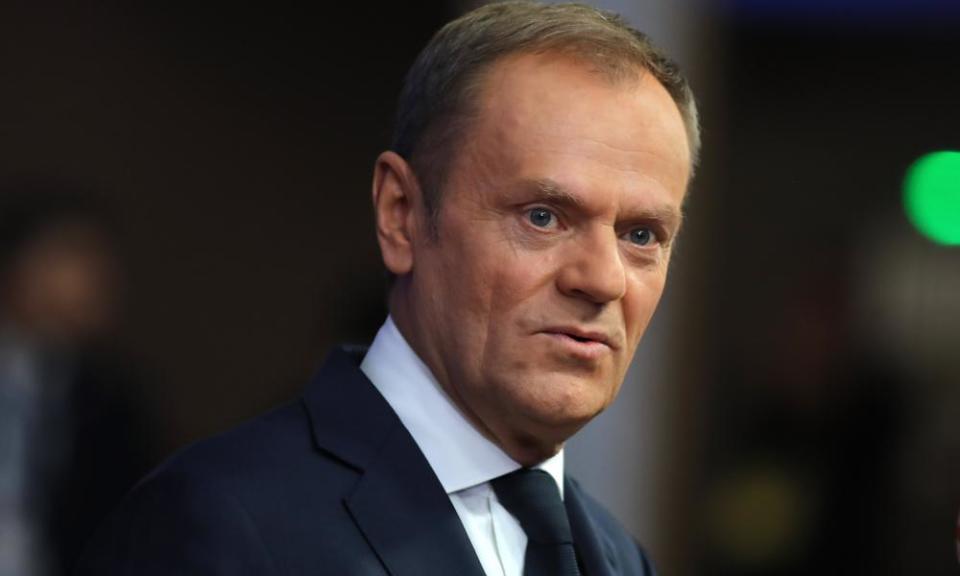Bitter divisions over migration threaten show of unity at EU summit

Divisions over migration marred a show of unity at an EU summit on Thursday, after Germany and Italy hit back at plans that could spell the end of mandatory refugee quotas.
Germany, Italy and the Netherlands have led criticism of a proposal from the European council president, Donald Tusk, who has described refugee quotas as “divisive and ineffective”.
The Greek prime minister, Alexis Tsipras, whose country has struggled to manage large numbers of refugees and migrants, criticised Tusk’s comments as “aimless, ill-timed and pointless”.
Arriving at the EU summit in Brussels, the German chancellor, Angela Merkel, said there “cannot be selective solidarity” among EU member states”. Germany gave refuge to more than 1 million asylum seekers in 2015 and has been championing the policy of sharing refugees through quotas, when numbers could overwhelm other countries.
“We need solidarity not just in regulating and steering migration,” Merkel said, “but we also need internal solidarity.”
The row threatens to overshadow an EU summit insiders hoped would be a show of unity, with leaders launching landmark plans for greater military cooperation and basking in a common position on the first phase of Brexit talks.
Only three countries – Hungary, Poland and the Czech Republic – came out in favour of Tusk’s plan ahead of the summit. Slovakia, the other member of the Visegrád quartet, which recently held the EU’s rotating presidency, did not side with its neighbours.
The Czech Republic’s new prime minister, Andrej Babiš, said any attempt to impose “nonsensical” quotas in a majority vote would only widen the divisions in the EU. “It won’t happen.”
Poland’s new prime minister, Mateusz Morawiecki, said he was happy that Poland’s opposition to allowing refugees into Europe seemed to be gaining acceptance.
Poland, along with the Czech Republic, Hungary and Slovakia, pledged €35m (£30m) for Italian-led projects to protect the border at Libya, as part of EU efforts to stem the flow of people attempting the dangerous journey to Europe.
The Italian prime minister, Paolo Gentiloni, welcomed the financial contribution but said the four countries still needed to accept refugees. “We will continue to insist that a commitment on the relocation of refugees is needed.”
Officials have been even blunter in private: one European diplomat told his counterparts that Tusk’s paper should be put in the bin. Another diplomatic source said it was badly written and “much too unbalanced in favour” of central Europe.
However, another EU diplomat, from a country supporting quotas, said it was “time to attack the issue”, which was “starting to poison” other debates. “At this point in time, what I am expecting is a good old bust up and in a later phase we will narrow the field of possible outcomes.”
The EU is not aiming to reach conclusions on this thorny issue at the summit. “Divisions are accompanied by emotions which make it hard to find even a common language and rational arguments for this debate,” Tusk said, referring to the chasm of opinion on migration, but also the future of the single currency.
EU leaders agreed on compulsory quotas at the height of the migration crisis in 2015, despite opposition from four central and eastern european countries. The bloc is discussing whether to make quotas a permanent feature of the EU’s asylum system, but the proposals have been making slow progress.
The Tusk plan, reported by the Guardian earlier this week, took countries by surprise and is seen as out of step with months of work done by EU home affairs ministers.
The European commission, backed by several member states, has also been infuriated by what it sees as a march on to its turf of proposing EU laws and policies. In his letter to leaders, Tusk said he would present “a way forward for consideration by leaders” after June 2018 if there was no consensus.
“The European council [that Tusk leads] is not a legislative body,” said an EU diplomat. “I don’t think he can mean we should bypass our normal procedures.”
The commission has also been irritated by Tusk’s claim that the 2015 quota system was a failure. “The commission firmly disagrees with the statement that relocation as an emergency response has been ‘ineffective’,” a spokeswoman said. “Over 32,000 people have been relocated – over 90% of all those eligible.”
The commission said member states should be working towards a European approach. “Returning to a pre-crisis mode of isolated, uncoordinated, national action is not an option and would betray years’ worth of collective work to better the collective European response to managing migration.”
The UK, which has an opt-out from this part of EU asylum policy, has been sitting on the sidelines of the debate and has never taken part in mandatory refugee relocation.

 Yahoo News
Yahoo News 